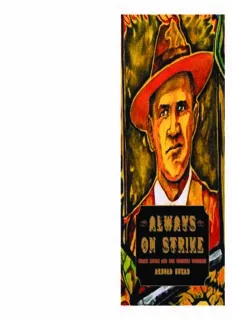
Always on Strike: Frank Little and the Western Wobblies PDF
Preview Always on Strike: Frank Little and the Western Wobblies
Always on Strike cover 12_Layout 1 11/4/14 12:47 PM Page 1 “[The governor] asked me what we would do if the companies did not yield to our demands. I told him we would call every man out of the mines. Then he said that if we did, that he would place them under federal control. I laughed and told him we would call out every worker in the country—agriculture workers, lumbermen, munitions workers, miners, mechanics, and all classes of working- men. He said, ‘Why, man, you wouldn’t do that. This country is at war.’ I said, ‘Governor, I don’t care what country your country is fighting. I am fighting for the solidarity of labor!’” P is considered by some to be the greatest organ- izer produced by the US labor movement and yet precious little has been written about the infamous Industrial Workers of the World (IWW) agi- tator. Little was a key leader of the country’s first free-speech fights, organized a number of mass strikes, and was considered such a threat to corporate interests that he was lynched by company thugs for decrying attempts at strike-breaking. Police and government officials not only turned a blind eye to his murder, they later used his words and actions to justify a campaign to scapegoat and persecute other members of the IWW. Always on Strike chronicles and critically engages with Little’s exploits in P hopes of exposing a new generation of radicals to his life, legacy, and politics. is a poet, fiction writer, historian, playwright, and jazz and film critic. Always on Strike text pages 7_all pages 10/21/14 5:48 PM Page i AlwAys on strike Always on Strike text pages 7_all pages 10/21/14 5:48 PM Page ii Always on Strike text pages 7_all pages 10/21/14 5:48 PM Page iii Always on Strike FrAnk little And the western wobblies Arnold Stead Haymarket Books Chicago, Illinois Always on Strike text pages 7_all pages 11/10/14 11:31 AM Page iv © 2014 Arnold Stead Haymarket Books PO Box 180165 Chicago, IL 60618 773-583-7884 [email protected] www.haymarketbooks.org ISBN: 978-1-60846-220-9 Trade distribution: In the US, through Consortium Book Sales and Distribution, www.cbsd.com In Canada, Publishers Group Canada, www.pgcbooks.ca In the UK, Turnaround Publisher Services, www.turnaround-uk.com All other countries, Publishers Group Worldwide, www.pgw.com Special discounts are available for bulk purchases by organizations and institutions. Please contact Haymarket Books for more information at 773-583-7884 or [email protected]. This book was published with the generous support of Lannan Foundation and the Wallace Action Fund. Cover design by Julie Fain. Cover image from a painting by Keith Seidel. Library of CongressCataloging-in-Publication Data is available. Printed in Canadaby union labor. 10 9 8 7 6 5 4 3 2 1 Always on Strike text pages 7_all pages 10/21/14 5:48 PM Page v To the memory of my brother, Christopher Anthony Stead, a workingman and artist Always on Strike text pages 7_all pages 10/21/14 5:48 PM Page vi Always on Strike text pages 7_all pages 10/21/14 5:48 PM Page vii Contents Introduction 1 Chapter One: The Western Wobblies 15 Chapter Two: The Free-Speech Fights 41 Chapter Three: Iron Miners, Harvest Hands, and Oil Workers 69 Chapter Four: Urgency and Conspiracy 111 Chapter Five: Big Bill Haywood and Frank Little 143 Chapter Six: Three Western Wobbly Martyrs 155 Conclusion: Frank Little, Where Are You Now that We Need You? 163 Acknowledgments 167 Sources 169 Notes 175 Index 183 Always on Strike text pages 7_all pages 10/21/14 5:48 PM Page viii Always on Strike text pages 7_all pages 10/21/14 5:48 PM Page 1 introduCtion Many years after the fact, during a far more conservative period of his life, Ralph Chaplin writes that Frank Little was the first to ar- rive for a meeting of the General Executive Boardof the Industrial Workers of the World in late July of 1917. Although we may have reason to doubt his memory(it has Little leaving Chicagoen route to Butte a full week after that city’s press announced the hobo agi- tator’s arrival in Montana), Chaplin’s vivid description of his last encounter with Little has a ring of truth to it. He writes: “Frank wore his Stetson at the same jaunty angle, and his twisted grin was as aggressive as ever.” The meeting’s primary purpose was to decide whether or not Wobblies should register for the draft. Board mem- ber Richard Brazier, like Chaplin and Haywood, thought opposing conscription would put the International Workers of the World, known as the IWW or the Wobblies, “out of business.” Little shot back at him: “They’ll run us out of business anyhow. Better to go out in a blaze of glory than to give in. Either we’re for this capitalist slaughter fest or we’re against it. I’d rather take a firing squad.” 1
Description: